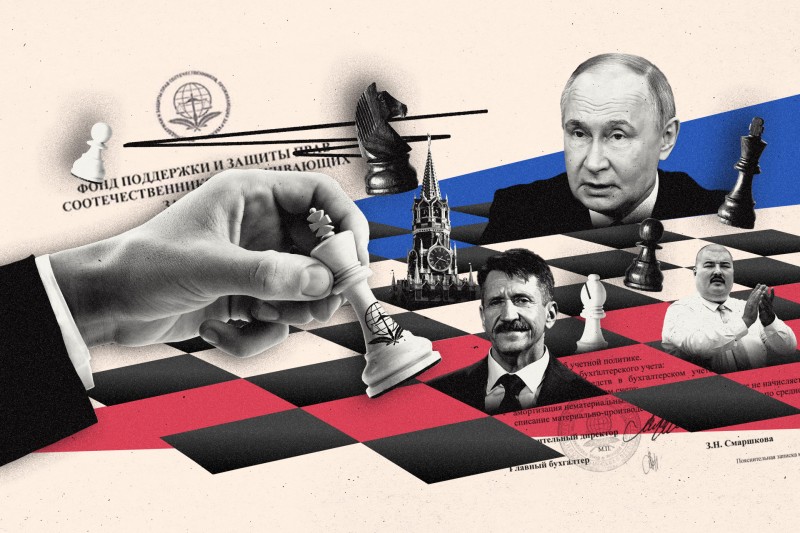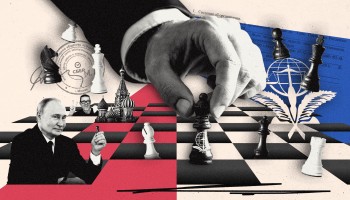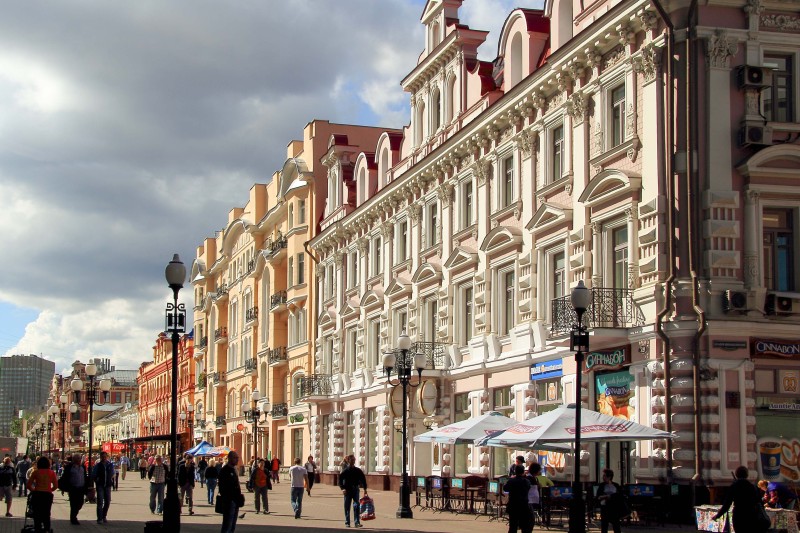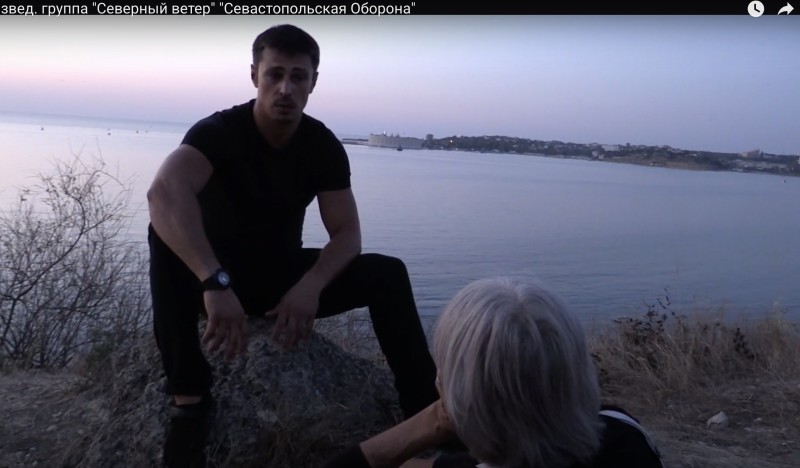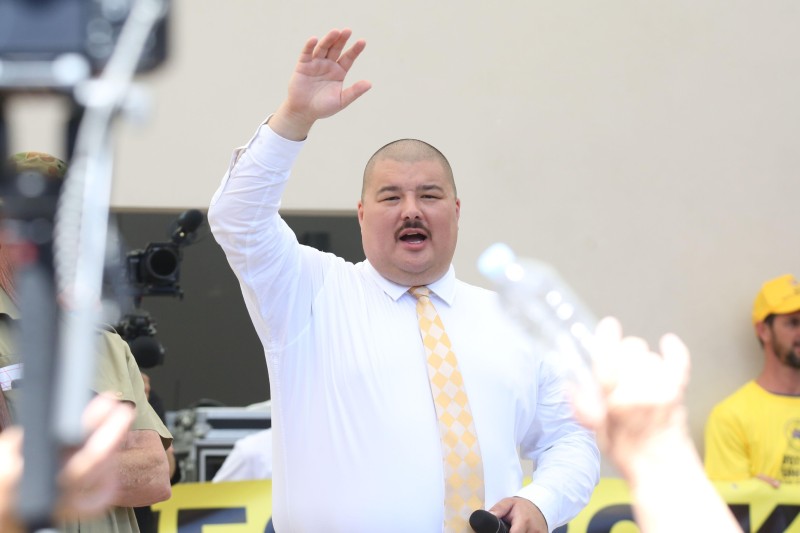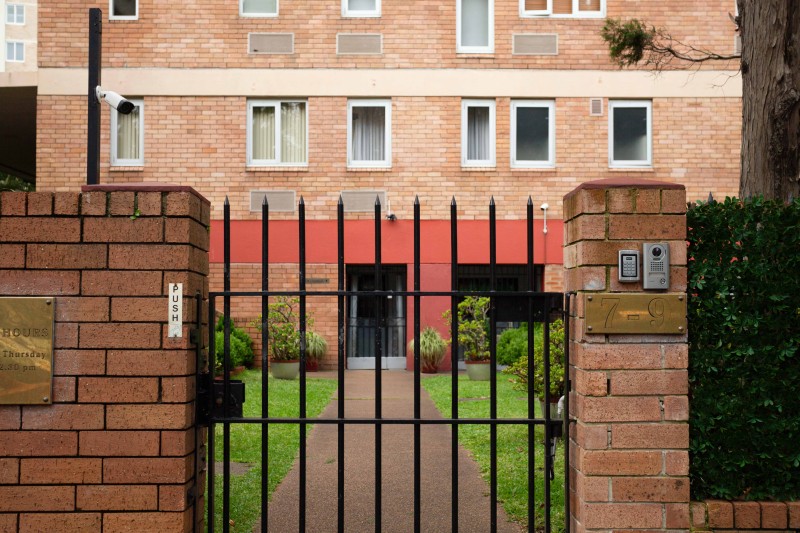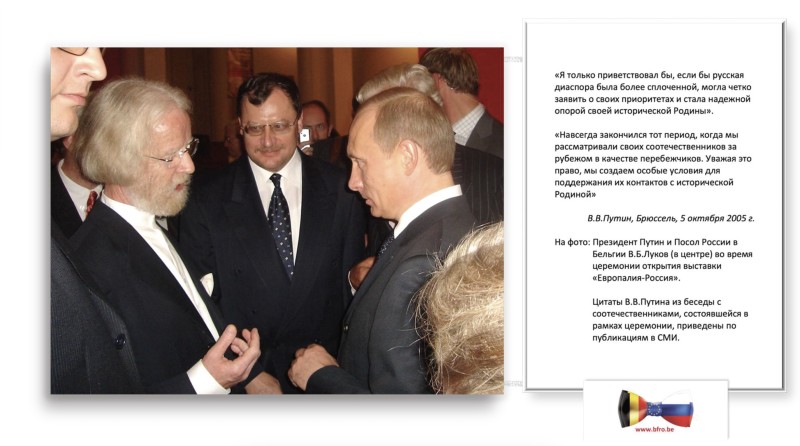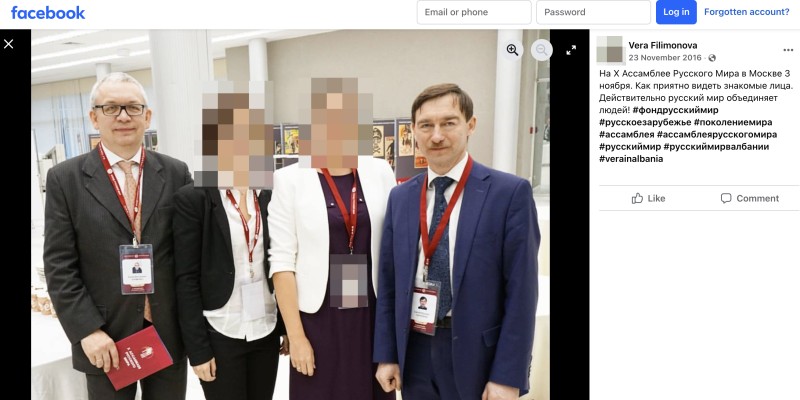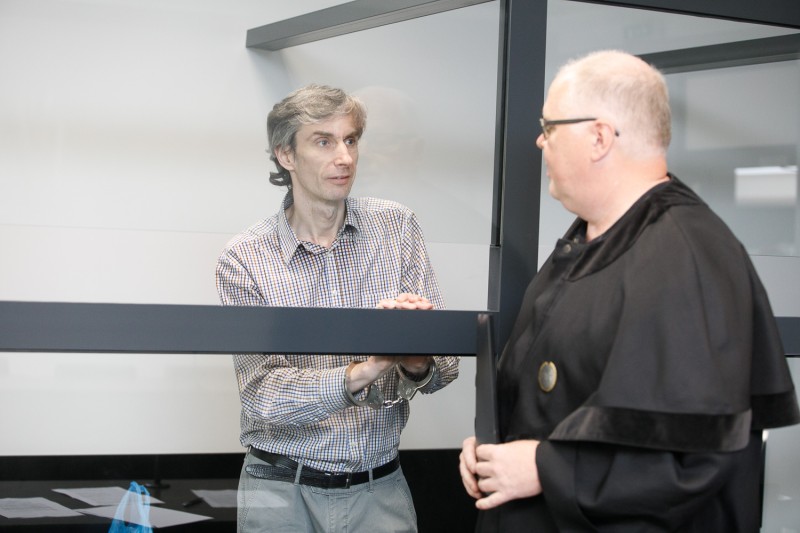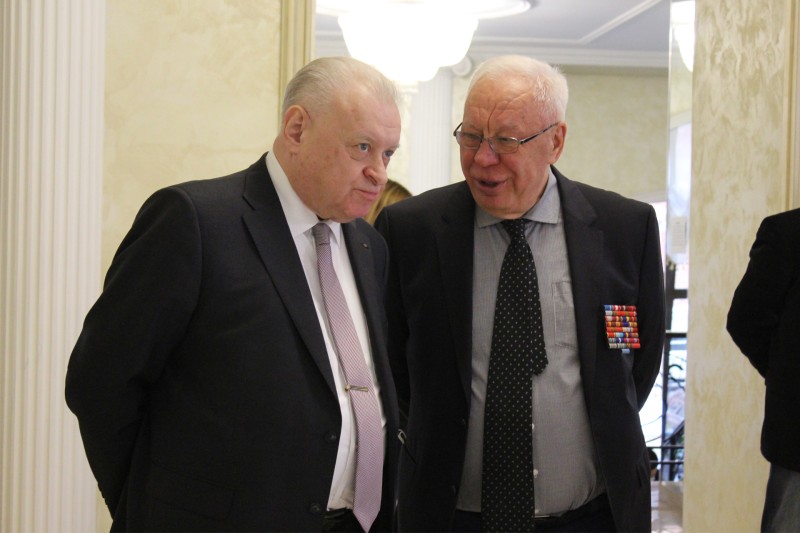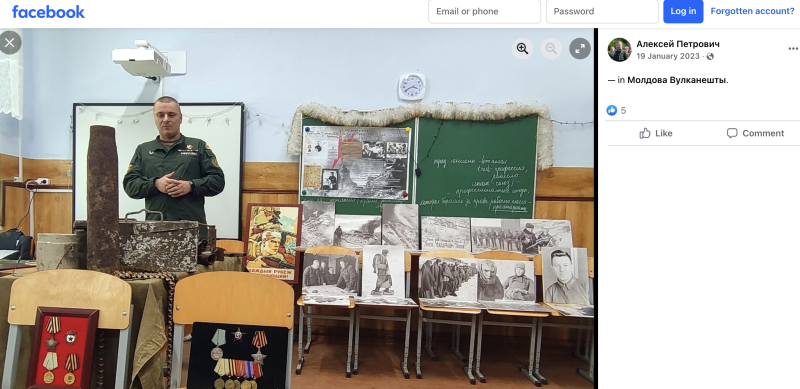Under the banner of human rights work, a state-backed Russian organization has spent years advancing the Kremlin’s geopolitical agenda across the world — including by funding the legal defense of alleged spies, criminals, and propagandists.
Among the recipients of its grants is a taxi driver convicted of espionage, a man convicted in the Czech Republic of leading an armed band during Russia’s annexation of Crimea, and an Australian activist who assaulted an elderly Ukraine supporter.
The “Foundation for the Support and Protection of the Rights of Compatriots Living Abroad,” also known in Russian as Pravfond, started operating in 2012 with the stated goal of defending the rights of Russians abroad, primarily by offering assistance if they get into legal trouble.
Last year, a leak of several dozen documents revealed that Pravfond had ties to Russian intelligence and had helped pay for the legal defense of notorious arms dealer Viktor Bout.
Now, an archive of nearly 50,000 emails from Pravfond, obtained by journalists from Danish public broadcaster DR and shared with OCCRP and 28 other media partners, exposes the inner workings of a foundation used by the Russian government to advance its interests around the world — defending spies, maintaining networks of influence, and funding propaganda — all under the banner of fighting for the human rights of Russian “compatriots.”
The emails show that Pravfond awarded well over 1,000 grants worth millions of dollars to people and organizations across the world over the course of about a decade. Despite being sanctioned by the European Union in 2023, Pravfond continued to send money to recipients in European countries, resulting in multiple possible sanctions violations.
Read more about how Pravfond and its grantees may have breached EU sanctions.
The emails also reveal how Pravfond collaborated with Russian intelligence agents to oppose a Lithuanian prosecution of former Soviet officials and military officers accused of committing war crimes during the country’s struggle for independence from the Soviet Union.
“Countries don't subsidize their citizens in foreign countries with legal costs,” said Edward Lucas, a Senior Fellow and Senior Adviser at the Center for European Policy Analysis. “So you have to ask why this is something that the Russian state wants to spend its tax incomes on.”
“This is a classic example of a Kremlin influence operation — working in plain sight, and exploiting the inherently trusting nature of a liberal society. … They are saying to these people, if you get into trouble we will pay your legal fees. And that sends a message: ‘We've got your back.’”
In line with its publicly stated mission, Pravfond does provide assistance for ordinary Russians who live outside the country, helping with problems like custody disputes and access to mental health services. Pravfond has also helped fund over 20 “legal support centers” for Russians living abroad, stretching from Spain to Mongolia.
Pravfond's headquarters is just off of central Moscow's famous Arbat Street.
But the organization focuses especially closely on the Baltic countries, with about a fifth of all known grants earmarked for Latvia, Estonia, and Lithuania. Ukraine is also well represented, as are many other former Soviet republics.
These are priority regions, Pravfond deputy head Vladimir Pozdorovkin wrote in one email, because they are where “our compatriots ended up unwillingly.” The view that millions of former Soviet citizens in neighboring countries are still part of the Russian cultural and political world is enshrined in Russian federal law and forms an important pillar of the Kremlin’s foreign policy.
Pravfond also funds propaganda and influence operations. It has paid to produce a Lithuanian history textbook that justifies the Soviet occupation of the country, funded pro-Russian Telegram channels, and paid for a Baltic-focused news site to publish hundreds of pro-Russian articles.
Above all, its work underscores the Russian government’s view that Russians anywhere in the world can become instruments of power and influence.
“[Russians abroad are] an army, a force that is very important to us,” said Pravfond’s executive director, Alexander Udaltstov, in an unpublished promotional video found in the organization’s emails.
Representatives of several European intelligence agencies told OCCRP they believe that Pravfond is operating beyond its stated mission, serving as an instrument of Russian intelligence services.
“The foundation was created to fund influence operations under the cover of combating discrimination,” said Marta Tuul, a spokesperson for KAPO, Estonia’s security service. “It is an extension of the Russian intelligence services, enabling the control and direction of the Russian-speaking diaspora.”
Normunds Mežviets, director of Latvia’s State Security Service, said his agency has been investigating Pravfond for years.
“We have seen … that in connection with this fund, individuals who present themselves as independent, let's say, experts, researchers, employees of this fund, are actually staff officers of Russian intelligence services,” Mežviets said. He did not provide specific examples.
Andrei Soldatov, a Russian investigative journalist and expert on the country’s security services, said it would be logical to conduct clandestine work under the cover of legitimate legal assistance.
“These days it’s getting more difficult to provide cover for Russian intelligence officers,” Soldatov said. “The embassies are not as big as they used to be. Russian cultural centers are closed in many countries.”
“But if you create a flow, a stream of legal services provided to the Russian community, of course it makes it easier. … It gives a new legal cover to your spies.”
Pravfond, its director Udaltsov, and its deputy director Pozdorovkin did not respond to requests for comment.
About the Pravfond Emails
A paramilitary leader, a taxi-driving spy, and an “Aussie Cossack”
Alexander Franchetti is perched on a rock in front of the Bay of Sevastopol, wearing an all-black outfit, as he calmly describes how he formed a paramilitary group in Crimea in the aftermath of Russia’s 2014 invasion of the peninsula.
“In three days we formed the first part of our group, five people,” says the Russian former fitness trainer, who has lived for years in Prague, in an interview posted on YouTube. “They were scouts; we picked people who knew how to read the forest.”
Franchetti makes no effort to hide how his armed band of a dozen men, named “North Wind,” collaborated with the Russian military. “We gave all the information to the navy command,” he recalls.
Alexander Franchetti being interviewed in Crimea.
Years later, when international law began to catch up to him, Pravfond was there to help. The organization awarded at least three grants totalling over 3.4 million rubles ($37,000) to pay several lawyers and a translator who worked on Franchetti’s defense after he was detained at the Prague airport in September 2021 at Ukraine’s request. (It is not clear whether all of this money reached its intended recipients, as Franchetti and his supporters faced obstacles in transferring some of the later batches, according to documents.)
Though a higher court eventually ruled against his extradition to Ukraine, Czech law enforcement immediately filed new domestic charges, accusing Franchetti and his group of facilitating sabotage operations, scouting energy infrastructure, and spying on Ukrainian government forces.
Franchetti was acquitted in October 2022. Though a prosecutors’ appeal was still pending, he quickly slipped away to Russia. The following year, his acquittal was overturned and he was sentenced to a prison term in absentia. He did not respond to a request for comment.
Franchetti wasn’t alone — the Pravfond emails show how the foundation repeatedly helped "compatriots" who had been arrested for supporting Russia's military or ideological goals.
In Latvia, the organization supported a man recruited to spy for Russia through a Telegram channel. Sergejs Sidorovs, a taxi driver, was arrested by the country’s security services in 2023. According to media reports from his trial, prosecutors accused Sidorovs of photographing military installations and Ukrainian-flagged homes and plotting to bomb a drone testing site near Riga.
Pravfond granted him 5,000 euros ($5,340) for his legal defense. He was convicted of espionage and received a 7-year prison sentence which he is now appealing. Sidorovs is also on trial again after being indicted for espionage in a new case. In response to a request for comment, Sidorov wrote that he had only photographed publicly accessible places and not military sites, that his plans to blow up a drone site were “only words” he had quickly forgotten, and that he had never been directly in touch with any security services.
Another case in Australia demonstrates Pravfond’s lobbying prowess within the Russian government — sometimes just as valuable as its financial support.
Simeon Boikov, who refers to himself as the “Aussie Cossack,” is a prominent pro-Russian activist based in Sydney. Having gained a following in part by promoting anti-vaccine conspiracies during the COVID pandemic, Boikov became widely known for his public advocacy on behalf of Russia, especially after the 2022 invasion of Ukraine.
Pro-Russian activist Simeon Boikov during a protest against mandatory COVID-19 vaccines in Sydney, Australia, in 2022.
With his provocative stunts and self-description as the "chieftain of the Australian Cossacks,” Boikov strikes a somewhat comic figure. But he has also been convicted of physical assault. After injuring an elderly Ukraine supporter in a public confrontation in December 2022, Boikov took refuge in the Russian consulate in Sydney to avoid arrest.
Boikov’s wife applied for at least three rounds of legal aid from Pravfond, and the organization helped him at least once, describing him in internal documents and letters to various Russian diplomatic departments as unjustly persecuted for airing pro-Russian views.
Pravfond also pulled numerous strings on Boikov’s behalf. After his retreat into the consulate, Boikov complained of being mistreated by the consul, who, he wrote, “dreams of giving me up to the Australian police.” In response, Pravfond convened meetings with high-level Russian diplomats and wrote letters lobbying for Boikov’s interests.
Most significantly, it also appears to have pushed for his naturalization, resulting in a 2023 decree from President Putin granting him Russian citizenship. “I express my genuine gratitude for your help in solving this matter,” he wrote Pravfond. “This is a huge joyful event for which I have been striving for many years.”
Boikov — who still lives in the consulate — continues to broadcast pro-Russian content to almost 90,000 Telegram subscribers. For a time he even registered with the Australian government as a correspondent for Russia Today. His case is featured as a success story in Pravfond’s draft annual report for 2022, found in the emails.
The Russian consulate in Sydney, Australia, where Simeon Boikov is living.
In response to a request for comment, Boikov told reporters he couldn’t discuss matters covered by attorney-client privilege, including the extent of Pravfond’s support for him. Asked why he had sought funding from an organization that supported Viktor Bout, Boikov said he was unaware of Pravfond’s other grantees.
“I didn't know about this fund … but even if I knew, even if I knew [them], I had no problems, because I think they're all heroes. They're my compatriots.”
“I think Victor Bout’s a great guy … he’s fantastic. He's a patriot. I'm a patriot.”
Boikov’s former lawyer said he had only been paid directly by Boikov or his wife, and never dealt with Pravfond. The Russian consul did not respond to a request for comment.
From Legal Support to Networks of Influence
In nearly two dozen countries, Pravfond funds a network of “legal support centers” that provide seemingly benign legal services to Russians, like translating documents and helping them get their pensions.
But in some cases, these organizations’ leaders are also key figures in Russian influence operations, working to align Russian diaspora media with Kremlin messaging or putting on cultural events for children while receiving instructions from Russian military intelligence.
In a 2017 informational note found in the emails, a Pravfond adviser describes these centers as a “priority direction” for the organization. A summary table from 2022 lists 23 active centers, mostly in Europe and the former Soviet republics, as well as Jordan, Australia, and Turkey. Many received between 10,000-20,000 euros in support per year.
The centers had a clear ideological mission: In 2022, just days after Russia’s full-scale invasion of Ukraine, Pravfond held a teleconference with all its legal centers to inform them “about the reasons and goals of Moscow’s decision to conduct a liberation mission in Ukraine,” as its director wrote in a 2022 letter to Russia’s Foreign Ministry.
He attached a summary describing how the centers in various countries had continued their work after the invasion: The Jordanian center helped defend a youth organization called “Generation Z” against “radicalized elements of the Ukrainian diaspora,” the French center helped coordinate a lawsuit against banks that refused to serve Russian passport holders, and the Ukrainian center — “unable to carry out its activities too openly, fully, or effectively” in light of the “anti-Russian policies of the Ukrainian authorities” — helped Russian citizens defend themselves against charges of treason.
Some local leaders of these centers appear to be active figures in advancing the Kremlin’s interests.
Among them is Serguei Petrossov, the onetime head of the Belgian legal support center, who was also the main web editor and secretary of the Belgian Federation of Russian-speaking Organizations. This group — which, in one promotional brochure, quotes President Putin’s desire for a diaspora that will be a “reliable support for its historical Motherland” — has held numerous public events promoting unity between the Russian state and Russians abroad. It also claims to host the “largest Russian cultural event in Belgium.”
A brochure by the Belgian Federation of Russian-speaking Organizations features Russian president Vladimir Putin.
In 2014, the Belgian Federation held a round-table on “informational warfare in the 21st century,” whose goal, according to a document found in the emails, was to come up with policies that would help Russian diaspora media more effectively spread pro-Russian narratives. A news item about the event, co-authored by Petrossov, notes that the Russian diaspora is “virtually the only tool for conveying an alternative perspective and interpretation of current events to public opinion in their countries.”
That same year, Petrossov was an election monitor during Crimea’s referendum on joining Russia, held under Russian occupation and widely viewed as an illegal Russian power grab. He later praised the resulting annexation as а “restoration of historic justice for which the Russian leadership should get due credit.”
Petrossov’s organizations kept working for years, but officially closed about two years after Russia’s full-scale invasion of Ukraine in 2022. “We have decided to stop accepting subsidies from Russia,” he told journalists from the Belgian outlet Knack last year, referring to sanctions against the country and “the general situation.” Petrossov did not respond to a request for comment.
Another prominent member of the Russian diaspora associated with Pravfond is Yury Eremenko. Based in Germany, he has for years been the head of a Russian website called Russkoe Pole (“Russian Field”) that features patriotic pro-Russian content and also works as a kind of virtual legal assistance center. In recent years, it has provided free legal consultations for Russians in Germany through a Berlin-based lawyer.
For this work, an organization headed by Eremenko’s wife, with Eremenko as her deputy, was granted at least 180,000 euros ($194,400) from Pravfond since 2018. Documents found in the emails show that the equivalent of at least 78,240 euros were granted — and 36,717 received — after June 2023, when Pravfond was sanctioned.
The organization run by the pair, the Gagarin Association for Integration, also organizes cultural events, Russian lessons, and drawing classes in the Erfurt area. These activities are largely aimed at children, and a laudatory biography of Eremenko posted on his site describes him as an “organizer of many projects in the field of culture, preservation of historical memory, and work with youth.”
But there’s another side to Eremenko’s work. In a report about his legal center’s activities, he describes forging connections to Vadar, an organization that advocates for the rights of Russian speakers in Germany that was founded by prominent members of the far-right German AfD party. The relationship, he wrote, “should not be public, because of the reputation in German society of the AfD party.”
Moreover, sources from two separate European intelligence agencies alleged that Eremenko has been in contact with GRU operatives, with one saying he received instructions from a handler from Unit 54777, which deals in psychological operations, to attend a 2016 conference and to produce media coverage about it favorable to Russia.
Eremenko has been photographed on several occasions with Sergei Panteleyev, who is sanctioned by the European Union for being a member of this GRU unit.(Incidentally, an organization run by Panteleyev also maintains Pravfond’s website.) Eremenko and Panteleyev did not respond to requests for comment.
Pravfond grantee and legal aid center head Yury Eremenko (left) and sanctioned GRU memher Sergei Panteleyev (right).
Entangled in Espionage
It was a case of modern-day espionage with some old-fashioned cinematic flourishes: The conspirators locked their phones in a safe before meeting with FSB intermediaries. They stayed at the summer home of a former KGB colonel. And they received thousands of euros in cash.
These details, newly revealed in the Pravfond emails, come from the case file of Algirdas Paleckis, a Lithuanian politician now serving a five-and-a-half-year prison term for espionage.
He had been tasked with helping the Russian government undermine a high-profile trial in his home country that had stirred outrage in Moscow: the prosecution of 67 former Soviet officers and officials for war crimes committed during an attempt to crush the Lithuanian independence movement in January 1991.
Paleckis and a co-conspirator were recruited to report to the Russians the home addresses of the Lithuanian judges and prosecutors involved in the trial. (The co-conspirator cooperated with the authorities and was freed of criminal responsibility.)
Pravfond also got involved behind the scenes, its emails reveal. The organization financed a small legal aid grant for Paleckis, larger grants to defend several of the former Soviet officials, and a public relations campaign that sought to make their case to the public.
In so doing, Pravfond assisted and collaborated with multiple intelligence operatives, joining an effort that, according to the Lithuanian security services, was “coordinated by the administration of the President of Russia and the FSB.”
Their assessment was cited in an appellate court decision on Paleckis’s case that was found in the emails, shedding additional light on Pravfond’s entanglements with the world of espionage.
Lithuanian politician Algirdas Paleckis is serving a five-and-a-half-year prison term for espionage.
Making multiple appearances in the court decision are two men who helped recruit Paleckis. One was Mikhail Golovatov, a colonel who led the elite “Alpha Group” KGB unit during the 1991 crackdown. The other was an intermediary between Paleckis and Golovatov, a fellow former “Alpha” officer named Eduard Kruglov.
Both men, described as closely linked to the FSB, had repeated and involved dealings with Pravfond.
Golovatov was himself a prominent defendant in the mass trial — and Pravfond amply funded his legal defense, to the tune of over $30,000. He was found guilty, along with the 66 other defendants, and received a 12-year prison sentence in absentia before dying in 2022.
Pravfond director Alexander Udaltsov (left) and Mikhail Golovatov (right), a former KGB colonel closely linked to the FSB.
Kruglov’s email address appears over 300 times in the Pravfond emails, showing him to be in regular contact with deputy director Pozdorovkin. The emails show him discussing the defense of another Vilnius case defendant, a tank officer named Yury Mel who took part in the storming of the Lithuanian capital’s TV tower.
Mel became a cause celebre among patriotic Russians after becoming one of just two men put behind bars in the case. Pravfond paid Lithuanian lawyers at least 111,000 euros to represent him over multiple years. Mel was sentenced to a seven-year prison term in 2019 and returned to Russia after his release.
Pravfond also funded a public relations campaign aimed at discrediting the Lithuanian investigation. This was run by an organization called Our Compatriots, founded by Golovatov, that consisted of former KGB and FSB officers connected to the 1991 events.
The organization’s president, Vladimir Derevnin, was a KGB veteran who used a “VladimirFSB” email handle. Contracts and documents found in the emails show that, with Pravfond money, Our Compatriots held a televised round-table about the 1991 events, put on a photo exhibition event at Russian Duma, and carried out other public-facing projects.
“The January 13 trial poses a direct challenge to the Kremlin’s myth of Soviet greatness,” said Nerijus Maliukevičius, a political scientist at Vilnius University. “This is why Lithuania has been subjected to persistent and targeted information attacks focused on this theme.”
“These are not isolated incidents but part of a long-term information warfare campaign,” he said. “The Pravfond case is yet another confirmation of this strategy.”
Paleckis, Kruglov, and Derevnin did not respond to requests for comment.
‘Form a Positive Image of Russia’
Pravfond expends a considerable fraction of its resources on projects to influence public opinion in a pro-Russian direction. Dozens of contracts found by reporters in the email archive concern media work.
In Greece, for example, Pravfond provided funding for the Dialogos Club, a Greek-Russian association whose website says its goal is to “form a positive image of Russia in Greece and Greece in Russia.” Dialogos has held a number of conferences with Pravfond’s support, including events commemorating Soviet achievements in World War 2 and celebrating the Russian constitution. In 2020, it held an online seminar about “objectivity in journalism in the context of hybrid information warfare,” with Pravfond funding a book based on the results.
In an email promoting the book’s publication, Theodoros Ignatiadis, the head of Dialogos, cites its timeliness amid an “informational and hybrid war waged against Russia,” including by “dirty fakes” in the “mainstream media,” and praises the publication of a book that reflects “truthful alternative opinions of prominent experts.” Ignatiadis did not respond to requests for comment.
Another Pravfond grantee, a prolific Latvian digital media outlet called IMHOclub, has published hundreds of articles with titles like “Why is Latvia making Russia its enemy?” and “Well, Balts, how’s it going without Lenin?” in which multiple contributors disparage Latvia and the European Union and voice support for the Russian invasion of Ukraine.
Three of IMHOclub’s staff, including its cofounder, journalist Yuri Alekseev, were arrested in November 2018 and charged with conducting activities against the sovereignty of Latvia. The defendants maintain their innocence. Two have left the country, participating in the most recent April 11 hearing remotely.
Documents in the email archive show that Pravfond has granted at least 6.4 million rubles ($65,800) to IMHOclub since 2022, including to host a virtual “anti-fascism conference” — attended by pro-Russian activists and politicians from multiple countries — that resulted in an anti-Ukrainian resolution meant for submission to the UN and other international bodies. Pravfond has also paid nearly 17,000 euros for the defendants’ legal fees.
IMHOclub’s latest available application to Pravfond, in which the organization asked for 9.6 million rubles ($127,000) to continue publishing and to expand its reach to Moldova and Poland, aimed to “resist the demonization of Russians in Europe” and “form a loyal attitude of European citizens towards Russia.”
In that case, Pravfond decided to fund only a fifth of the requested amount, prompting IMHOclub to write a letter to Udaltsov reminding him of their ten-year cooperation and asking for fuller funding in the future. Despite the limited funding, however, IMHOClub’s work continues. The organization and Alekseev did not respond to requests for comment.
Pravfond is also active in Moldova, a country where Russian influence is a sensitive topic. Among its grantees in the country was Alexei Petrovich, a pro-Kremlin activist whose organization was awarded nearly half-a-million rubles ($7,500) for a mobile exhibition called “Immortal Stalingrad,” commemorating the Soviet victory in World War 2 even as Russia’s full-scale invasion of Ukraine raged next-door.
Dressed in military-style clothes, Petrovich visited several schools to speak about the famous battle, an event that was described by public television in the pro-Russian region of Gagauzia as "a lesson in patriotism."
Pro-Kremlin activist Alexei Petrovich.
In response to a reporter’s questions, Petrovich said that a different “Immortal Stalingrad” exhibition from several years earlier had not been funded by Pravfond. He also said its goal was only to educate about history: “We were not talking about the war in Ukraine, we did not tie it to that context, but spoke exclusively about historical facts,” he said. He did not respond to questions about the 2022 exhibition.
The list of projects goes on. For example, Pravfond also provided funding for the online publication of a Lithuanian history textbook — complete with a foreword by Russian Foreign Minister Sergei Lavrov — that presented the country’s occupation by the Soviet Union in a positive light.
As recently as this April, new requests for money were still coming in. One applicant asked for 11.5 million rubles ($125,000) to support five Telegram channels in the Baltics that have “already started to unite [pro-Russian bloggers] into a single virtual network.” Another Telegram project, according to its own application, is “repeatedly mentioned in the Danish press as an example of Russian propaganda.”
But at least one of Pravfond’s leaders held his beliefs in earnest.
In a private email to a friend, sent just a few months before his death in August 2024, former executive director Igor Panevkin wrote that many Russian expats living abroad have “stopped believing in Western democracy and in [its] goals, which distort the very essence of humanity.”
“I write this not as propaganda,” he added. “I truly believe that Russia has a more correct historical path.”
Inga Springe (Re:Baltica), Holger Roonemaa (OCCRP) Guna Gleizde (Nekā personīga; TV3 Latvia), Marcela Zamosteanu (RISE Moldova), Mindaugas Aušra (LRT), Indrė Makaraitytė (LRT), Hannes Munzinger (Paper Trail Media), Kristina Vejnbender (investigace.cz), Damien Leloup (Le Monde), and Sean Nicholls (Australian Broadcasting Corporation) contributed reporting.
Update, May 21, 2025: A response to requests for comment from Sergejs Sidorovs was received after publication and added to the story.
